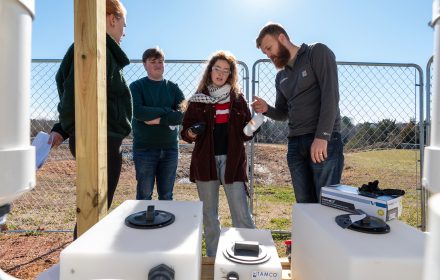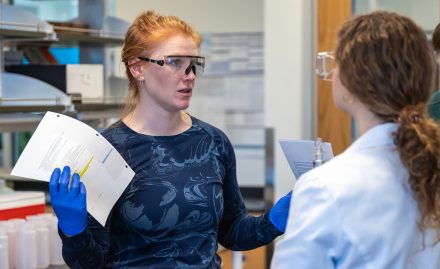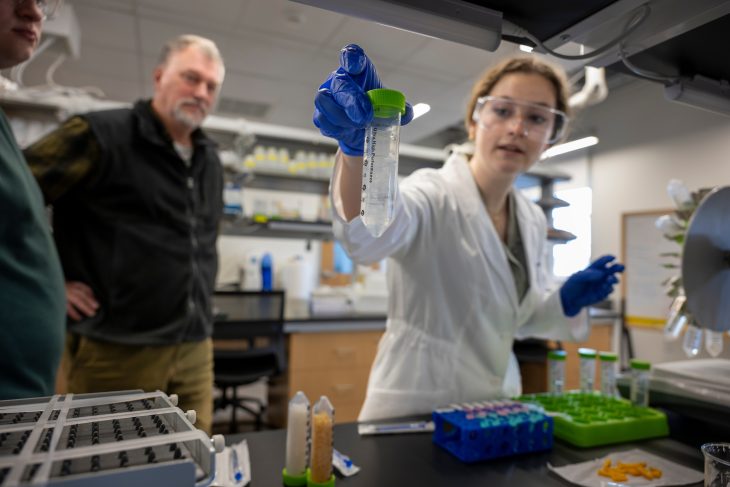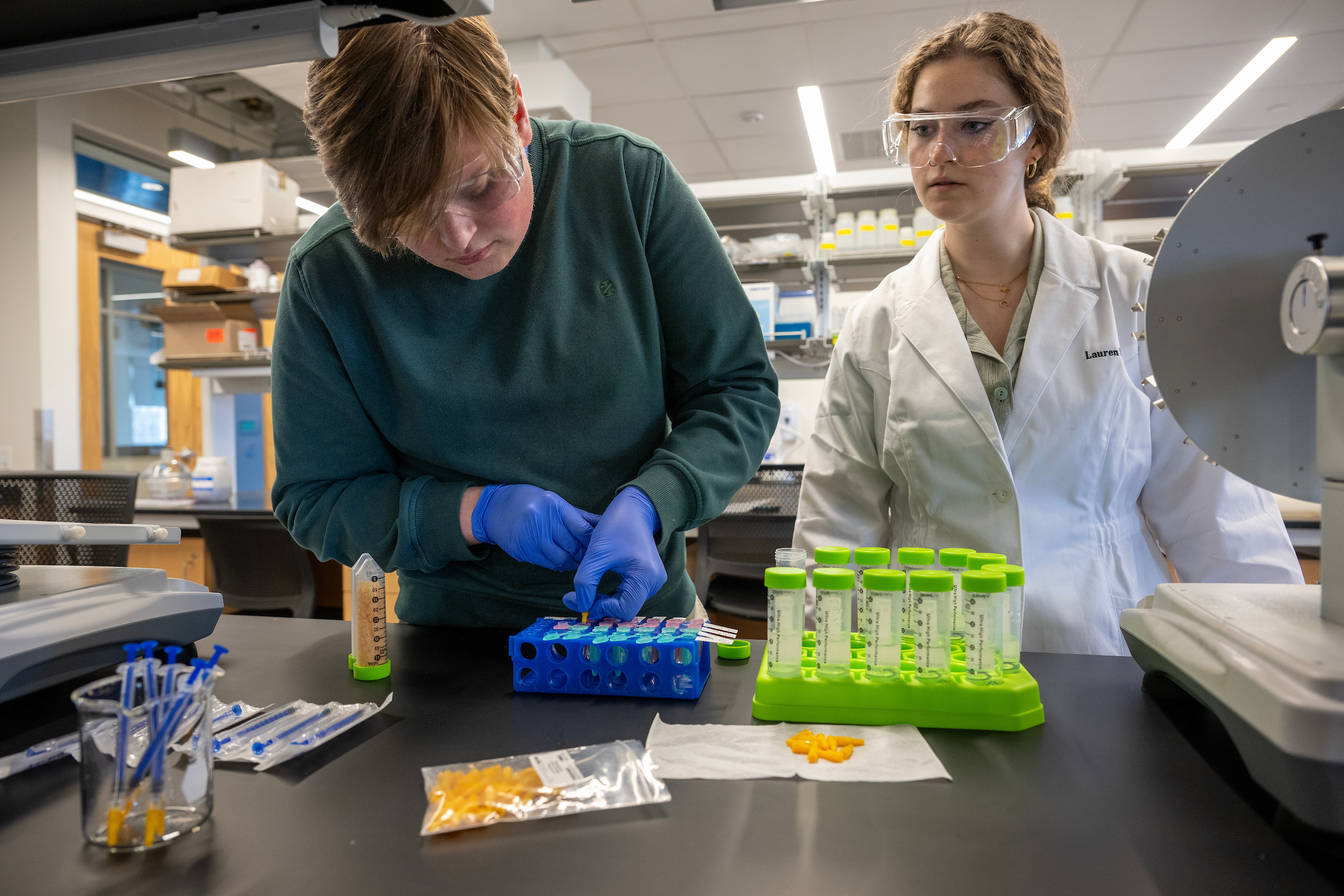The research collaboration with Duke University’s Center for WaSH-AID, Oldcastle Infrastructure, a CRH Company, and Triangle Environmental Health Initiative is being piloted on Elon’s campus through 2024.
Elon engineering students are participating in research and development of a proprietary new material that holds potential to decrease pollution in stormwater runoff in a collaboration with researchers at Duke University and sponsored by Oldcastle Infrastructure, a CRH Company.
The project originated in Duke’s Center for WaSH-AID (Water, Sanitation, Hygiene and Infectious Disease) and is in Phase II for field testing at Elon. This phase includes water collection at a station on Elon’s South Campus as well as data collection and analysis in Innovation Hall’s environmental and biosafety labs and will continue through the fall.

Excess nutrients in stormwater runoff threaten human and environmental health. The nitrogen and phosphorous from fertilizer, pet waste and other sources is carried into creeks, rivers and lakes. Those contaminants contribute to algal blooms, which can be toxic to humans and aquatic life.
Lauren Hill ’24 and Seth Wolter ’24, both engineering majors with concentrations in environmental engineering, began internships with the project last fall. They are working with Julia Darcy, WaSH-AID assistant research professor, Scott Wolter, associate professor and chair of Elon’s Department of Engineering, and Will Pluer, assistant professor of engineering, to conduct a series of laboratory tests on stormwater collected after it’s run through different sorbent media — materials that collect molecules of other substances — at the pilot unit on south campus.
“This kind of work lines up perfectly with what I want to do in grad school and what I want to research in my future career,” Seth Wolter said. “I want to work with labs and professors who do similar lab-based work with water-quality issues.”
Their results will inform which concentrations are most effective at removing phosphorous and nitrogen in various precipitation events and conditions.
Oldcastle Infrastructure, which is sponsoring the research, is a leading provider of solutions that connect and protect critical water, communications, energy and transportation infrastructure with a focus on sustainability.
In Phase I, Duke Center for WaSH-AID researchers developed a novel sorbent inorganic/organic material that showed strong performance in lab tests for phosphate and nitrate removal. The material is adaptable to use in stand-alone filter cartridges as well as mixed-media beds and can be easily retrofitted into existing bioretention or filtration systems.
“It’s exciting to be working with Oldcastle because they are one of the leaders in stormwater management,” said Darcy, who joined the project last March. “In the world we live in, which is full of impervious surfaces, management of stormwater and the nutrients and other pollutants it picks up is critical. Oldcastle is grappling with this water-quality problem, and it’s cool that they are investing in this technology development.”

For Phase II, Triangle Environmental Health Initiative, which engineers water management systems, was subcontracted to design and build the pilot system, and Wolter and Elon University were enlisted to provide laboratory testing and support of the pilot on campus. Wolter has connections to both WaSH-AID and Triangle Environmental through previous work at Duke University and collaborative research in a Bill and Melinda Gates Foundation-funded project to reimagine the toilet and improve sanitation in underdeveloped countries. Pluer is guiding students with expertise in ion chromatography for chemical analysis.
The location on Elon’s South Campus near the golf training facility and Fire of the Carolinas practice field was selected for field testing because runoff there flows from impermeable surfaces and agricultural sources into a creek basin. Collection for Phase II is expected to continue through 2024, giving researchers a full year of mitigation data throughout changing seasons and conditions.
“Working with stormwater and affecting the surrounding ecosystems is directly related to what I want to do after graduation,” Hill said. “I have grown to love the combination of fieldwork and analyzing samples in the lab.”
Both Hill and Seth Wolter plan to pursue advanced environmental engineering degrees and are currently applying to graduate programs. They are among the first class of Elon’s B.S. in Engineering – Environmental Concentration degree program, which will graduate five students in May.
Darcy said Hill and Seth Wolter have been ideal interns for the project.
“They’re really enthusiastic and I appreciate their ability to say, ‘I don’t know how to do this, but I will work with you to learn how.’ That’s a great skill to have and something they really embody at Elon: Being ready to learn and try new things,” Darcy said.
Students value the collaborative nature of the research project, and that it’s allowed them to grow their laboratory skills in a professional setting.

“Dr. Darcy has created a safe learning environment for both Seth and me, and I feel confident to try new things without the fear of making mistakes,” Hill said. “Dr. Darcy has been an incredible role model, especially as a woman in STEM leading such an impactful project in the climate science field. She is truly the scientist I want to be.”
Mitigating this stormwater pollution has been a focus of Elon’s Department of Engineering through various projects, including several in junior-level research methods courses and Senior Projects in Elon Engineering Design that developed technology for constructed floating wetlands.
Wolter said the project with Oldcastle Infrastructure and WaSH-AID continues that focus on water research and fulfills the mission of Elon’s Innovation Quad, which includes 20,000 square feet of lab and prototyping spaces in Innovation and Founders halls.
“We’re very happy to be working with WaSH-AID in this high-level research and development work,” Wolter said. “It’s great experience for our students to get to work with professionals, and it meets Elon’s intention of filling the Innovation Quad with high-quality, significant research that finds solutions to 21st-century problems.”



